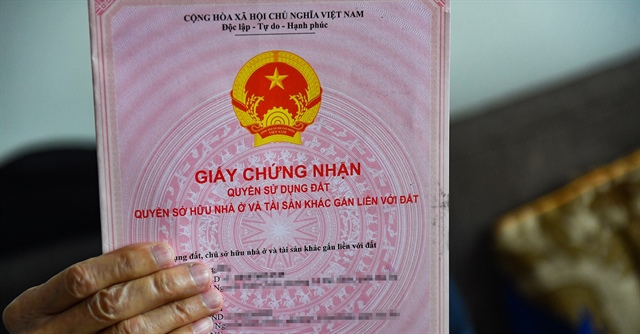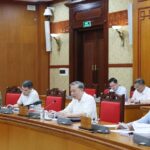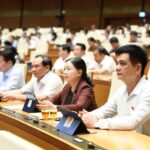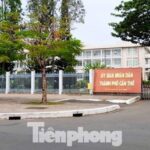The Ministry of Agriculture and Rural Development is seeking feedback from ministries, sectors, and local authorities on a draft decree on decentralizing land management authority to a two-tier government model.
A notable proposal in the draft is to grant People’s Committees at the communal level the authority to issue land use certificates for the first time.
According to the draft proposal, transferring this authority from the district to the commune level will provide greater convenience to citizens, especially in rural, remote, and far-flung areas.
Currently, many localities face challenges due to their dependence on the district level for land-related matters, resulting in multiple trips for citizens and incurring time and cost.

The draft proposes additional authority for communes in land management. Source: VNN |
The draft also suggests streamlining procedures by delegating certain competencies to the commune level, such as allocating residential land to individuals and executing specific steps in land registration…
Consequently, People’s Committees at the commune level will be exempt from reconfirming details like planning, dispute status, or land usage stability—tasks that communes already undertake and are legally recognized.
The Ministry of Agriculture and Rural Development also recommends clarifying the roles and authority of People’s Councils, People’s Committees, Chairpersons of People’s Committees, and specialized agencies at the commune level in land management, especially for complex land types like ponds, lakes, and marshes that span multiple areas.
However, this proposal warrants careful consideration on a case-by-case basis. For land that has already been allocated or leased by the State, issuing land use certificates is the final step in the process, and thus can be delegated to the commune level to ensure uniformity.
In contrast, for unregistered land, issuing land use certificates implies the State’s initial establishment of land use rights, necessitating a rigorous legal and technical evaluation.
Without proper oversight mechanisms, there is a significant risk of negative consequences, including the legalization of encroached land, misrepresentation of land origins, or disputes.
Therefore, decentralization must be coupled with clear definitions of responsibilities and powers for the commune level and the establishment of effective monitoring and supervision systems by higher authorities.
These are crucial factors in ensuring that the process of issuing land use certificates at the commune level is transparent, efficient, and compliant with the law.
Vu Diep
– 18:50 05/14/2025
The Magic of Words: Transforming a Title with Creative Flair
“Unveiling the Vision: The Mayor of Can Tho Directs the Implementation of the Government Inspectorate’s Conclusion.”
The Can Tho authorities will reclaim over VND 463 billion to the budget and make deductions of more than VND 2.5 billion upon project settlement. They will also urge seven investors to pay over VND 193 billion in delayed commitment fees and address instances of improper refunds as per the conclusions of the Government Inspectorate.
The Speaker: In Many Places, Only a Change in Party Secretary or Chairman Results in Alterations to Urban Planning
“The Speaker of the House expressed concern over the lack of long-term vision in provincial planning. He noted that the efforts of the current secretary and chairman to develop a comprehensive plan might be undone by the next administration, leading to a constant cycle of changes with little stability.”
Unveiling Corruption: Government Inspectorate Exposes Land Management Violations in Can Tho
The Government Inspectorate has revealed that the former Department of Natural Resources and Environment of Can Tho issued thousands of land-use certificates for project development, which were not in accordance with the Land Law. Similarly, irregularities were found in the land leasing process for industrial zones.





















